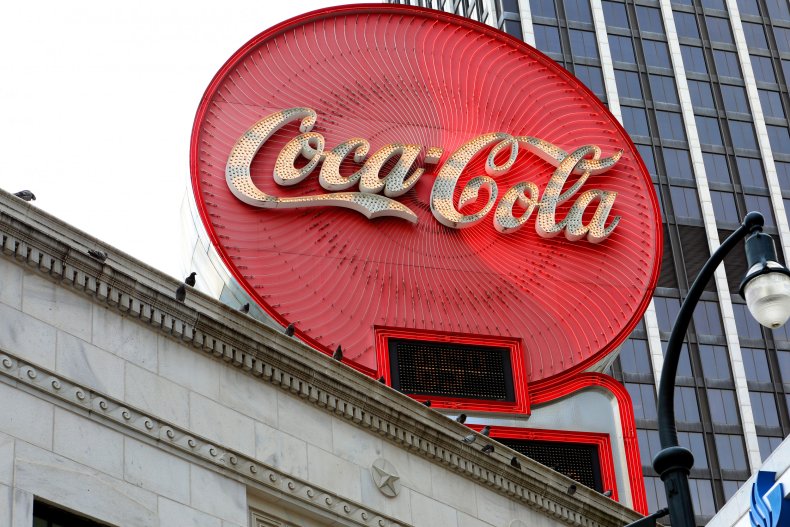Companies Speaking Out Against Georgia's Voting Law May See Their Reputations Boost
In a time of rising corporate activism, several Georgia-based companies have doubled down on their criticism of the Peach State's controversial voting law that opponents say makes voting more difficult.
After SB202 was signed into law by Governor Brian Kemp on March 25, voting rights activists and religious leaders in Georgia called out companies that did not strongly denounce the legislation. Bishop Reginald Thomas Jackson of the African Methodist Episcopal Church and other religious leaders announced a national boycott of Coca-Cola, Delta Airlines and Home Depot scheduled to take effect on April 7, according to the Atlanta Journal-Constitution (AJC).
Days after his company's initial statement was released, Delta CEO Ed Bastin issued a memo to employees, calling the bill "unacceptable" and expressing that the final bill does not match the company's values.
"The right to vote is sacred. It is fundamental to our democracy and those rights not only need to be protected, but easily facilitated in a safe and secure manner," Bastin said. "It's evident that the bill includes provisions that will make it harder for many underrepresented voters, particularly Black voters, to exercise their constitutional right to elect their representatives. That is wrong."
He added that "the entire rationale for this bill was based on a lie," referencing the unproven claims of mass voter fraud in Georgia during the 2020 presidential election that were touted by former President Donald Trump and his supporters in Congress.
Coca-Cola was also criticized for not condemning the bill before it was passed. In a statement to Newsweek, Coca-Cola CEO James Quincey said the company is "disappointed in the outcome of the Georgia voting legislation."
"Throughout Georgia's legislative session we provided feedback to members of both legislative chambers and political parties, opposing measures in the bills that would diminish or deter access to voting," the statement said.
"Our approach has always been to work with stakeholders to advocate for positive change, and we will continue to engage with legislators, advocacy groups, business leaders and others to work towards ensuring broad access to voting is available to every eligible voter in our home state."
The company said it will now focus on supporting federal legislation that protects voting access and addressed voter suppression across the country.
Atlanta-based shipping company United Parcel Service (UPS) also made a pledge to do more to support voting access.
"UPS believes that voting laws and legislation should make it easier, not harder, for Americans to exercise their right to vote," a UPS spokesperson told Newsweek. "UPS will continue to work with elected officials across the country to strengthen our democracy by facilitating equitable poll access and voting."
For their positions, these companies are facing boycott calls from Trump and his supporters. In a statement Saturday released by Save America PAC, Trump called on conservatives to "fight back" against the Left's "woke cancel culture" by refusing to use products and services of the companies who spoke out against this bill.
Delta, Coca-Cola and UPS all declined to comment on Trump's calls against them.
Maurice Schweitzer, a professor at the Wharton School of Business at the University of Pennsylvania, said boycotts against companies typically fail to achieve their objective. He does not believe Trump's efforts will cause any long-term problems for any of these companies.
"For a boycott to be effective, it's got to be focused, it has to be long term, and it has to have a very specific objective," Schweitzer told Newsweek. "But these broad, diffuse boycotts of 'woke companies' [are] completely ineffective."
Brayden King, a professor at the Kellogg School of Management at Northwestern University, said there is "very little evidence that consumers actually change their behavior in response to boycotts, even when they publicly say that they support the boycott."
"Boycotts are effective, not because they get consumers to change their behavior, but because they create negative media coverage that companies don't want," King said to Newsweek.
Negative attention usually comes when a company's character is called into question. But in this case, companies are being boycotted because they are standing by their values. So far, King said the stock market shows these companies have not taken a big financial hit.
"These companies are not being punished by investors for taking these stands," he said. "Most investors seem to be unworried about what these stands are going to do to these companies' value in the long term."
In fact, speaking out may have a more positive payoff. "Executives are taking a stand and engaging in politics in a way that will upset some people, but will excite others," Schweitzer said. "We are expecting corporate leaders to be social and moral leaders and I think they're going to do well as a result."
These actions do not only boost the company's reputation in the eyes of consumers but for current and potential employees as well.
"Companies typically take a stand on social or political issues when they believe it's beneficial to their employees," King said. "I think that when companies are willing to take a risky stance, it's because they've considered what the backlash might be internally if they don't."
In a competitive job market, companies want to differentiate themselves through their values beyond just making a profit.
"Those companies had made commitments to their employees about the values of the workplace," King said. "And taking a stand was a stronger indicator to their employees and to the other internal stakeholders that this is something [the companies] really do care about."


